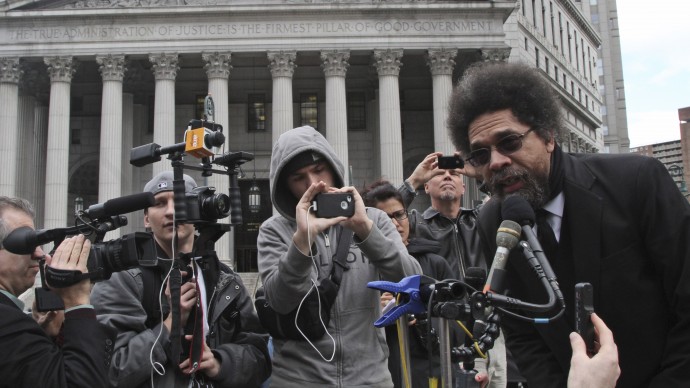
(MintPress) – The push to repeal the indefinite detention clause of the 2012 National Defense Authorization Act (NDAA) received a boost Wednesday when New York U.S. District Judge Katherine Forrest declared the measure unconstitutional and an infringement on First Amendment rights to free speech and the Fifth Amendment’s right to due process. Recently, President Barack Obama’s administration was the target of a lawsuit by civil rights activists and authors challenging the constitutionality of indefinite detention in America, the case which Judge Forrest took on.
Since its signing on December 31, provisions of the NDAA have been scrutinized for vague language that allows for indefinite detention (sect. 1021) of people who engage in “hostilities against the United States” can be detained without trial. Another provision (sect. 1022) states that those who violate sect. 1021 are required to be held by the United States Armed Forces instead of a smaller police force.
Obama, however, issued a signing statement after inking his name on the bill, saying he did not support the indefinite detention of American citizens without trial. Members of the Obama Administration and high-profile political figures such as John McCain said that the measure allows for such detainment, despite Obama’s intention of the signing statement. The NDAA is passed annually as a law to specify the budget and expenditures of the United States Department of Defense.
“I have signed the Act chiefly because it authorizes funding for the defense of the United States and its interests abroad, crucial services for service members and their families, and vital national security programs that must be renewed … I have signed this bill despite having serious reservations with certain provisions that regulate the detention, interrogation, and prosecution of suspected terrorists,” Obama said.
During the trial, two of the seven plaintiffs, Chris Hedges of the Nation Institute and Tangerine Bolen, operator of RevolutionTruth, used themselves as an example of someone who could potentially be detained under sect. 1021 because they are in contact with sources that the government could red flag and question under grounds of the Act. Plaintiffs for the case also included activist and professor Noam Chomsky as well as civil rights activist Cornel West, Daniel Ellsberg, Alexa O’Brien, Occupy London co-founder Kai Wargalla and Iceland parliamentarian Birgitta Jonsdottir.
“At the hearing on this motion, the government was unwilling or unable to state that these plaintiffs would not be subject to indefinite detention under [section] 1021,” Forrest wrote. “Plaintiffs are therefore at risk of detention, of losing their liberty, potentially for many years. … An individual could run the risk of substantially supporting or directly supporting an associated force without even being aware that he or she was doing so. In the face of what could be indeterminate military detention, due process requires more.”
Author and activist Naomi Wolf, who took notes on the trial for her website, told the Huffington Post that to finally hear a judge tell federal officials that the two provisions in the NDAA were unconstitutional was a victory for civil rights activists.
“To hear those words — it’s so true, it’s so obvious – it puts in glaring relief the hideousness, the unconstitutionality, the darkness of this legislative effort and others like it,” Wolf said. “She is so completely, obviously right. It’s nothing short of treason to have put forward legislation like this, let alone to have had most of the people who represent us and our president sign off on this clearly, obviously criminally unconstitutional – unconstitutional is inadequate. It’s anti-constitutional. It’s dictatorial.”
The push for repeal
Thursday opened up discussion for the 2013 NDAA and what amendments, if any, should set it apart from its 2012 predecessor. Currently, 142 amendments are on the books to be debated, including a bipartisan proposal that would “strike section 1022 of the FY2012 NDAA and amends Section 1021 of same Act to eliminate indefinite military detention of any person detained under AUMF authority in U.S., territories or possessions by providing immediate transfer to trial and proceedings by a court established under Article III of the Constitution of the United states or by an appropriate State court.”
At the helm of the indefinite detention repeal is Rep. Adam Smith (D-Wash.), who wrote an amendment that would require any person caught by the U.S. for suspected terrorism to be tried in a civilian court. On Wednesday, Smith received the support of Republican presidential candidate and Texas congressman Ron Paul, who stressed that the country is in “serious trouble” if indefinite detention provisions are not removed from the law.
“Hopefully we can be successful this week in clarifying this to make sure once and for all that we as a people don’t endorse the whole notion – which contradicts everything we should believe in – that we could be arrested and put in secret prisons,” Paul said.
Smith questioned the effectiveness of indefinite detention, arguing that the U.S. has shown it has the ability to prosecute charged terrorists and that indefinite detention does not work.
“In the last 10 years, we have successfully prosecuted – tried and convicted – over 400 terrorists,” Smith said. “Even as we sit here today, there are over 300 terrorists in U.S. prisons.”
Over the course of the spring, several states looked to repeal the Act’s controversial provisions by attempting to pass laws that would conflict with the federal legislation. In Tennessee, legislation was proposed to press kidnapping charges against the government if they exercised the indefinite detention clause against one of its citizens. Lawmakers in Utah pushed for repeal and exemption from the NDAA’s measures on the grounds of vague language that the legislation said did not specifically clarify what terroristic activities were or who would be deemed a terrorist under the law.
No state, however, has successfully repealed the provisions in the NDAA.


